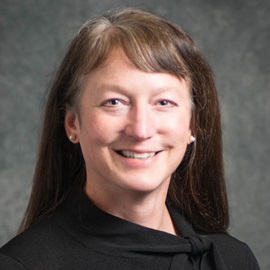
Our surgeons perform breast-conserving surgery (lumpectomy) or surgery to remove the entire breast (mastectomy). In some cases, lymph nodes under the arm may also be removed to check for cancer cells. The kind of surgery you have may depend on the size and location of your cancer and your personal preferences. We also work closely with breast reconstruction surgeons, if applicable. When appropriate based on your unique circumstances, cancer removal and breast reconstruction surgery may also be completed in one day as part of the same surgery.
-
Location & Contact Info
Accepting New Patients
Yes -
Office Hours
Mon - Thu: 9 a.m. - 5 p.m.Fri: 9 a.m. - 12 p.m.Referral Required
Yes -
Before Your Visit
-
For Current Patients
-
After-hours & Weekends
If you have a medical emergency, please call 911 or go directly to the Emergency Department.
Providers
-
General Surgery
Biography
Elizabeth R. Livingston, MD is a board certified general surgeon with a special interest in breast disease. She developed an interest in surgical management of breast diseases in medical school and residency, where she worked at the Fox Chase Cancer Center in Philadelphia. Dr. Livingston is a member of the American College of Surgeons and the American Society of Breast Surgeons.
-
-
Biography
Rachael Pedersen, NP is a family nurse practitioner who sees patients for postsurgical follow-up care. She earned her bachelor's degree in nursing from the University of Arizona and her master’s degree and family nurse practitioner certification from Grand Canyon University.Availability
Accepting new patients
-
General Surgery
Biography
Shelley Perkins, MD is a board-certified general surgeon with fellowship training in breast surgical oncology. While serving in the U.S. Navy, she cared for service members and military families around the world. Her scope of care includes benign breast concerns to high-risk monitoring to cancer and partnering with patients so they understand the details and arrive at the best treatment decisions.
Dr. Perkins is a member of the American Society of Breast Surgeons and a Fellow of the American College of Surgeons. She has significant leadership experience in hospital systems and optimizing how the health care team communicates for best patient outcomes. In her time away from work, she enjoys running, being outside, and taking care of her animals.
Availability
Accepting new patients
Make an appointment
St. Luke's Clinic - Breast Surgery: Boise
Call us to make an appointment.
(208) 381-7050
Office Hours
Make an appointment
St. Luke's Clinic - Breast and General Surgery: Meridian
Call us to make an appointment.
(208) 706-4650
Office Hours
St. Luke's Clinic - Breast Surgery: Boise
Call us to make an appointment.
(208) 381-7050
Office Hours
Make an appointment
St. Luke's Clinic - Breast Surgery: Boise
Call us to make an appointment.
(208) 381-7050
Office Hours
Make an appointment
St. Luke's Clinic - Breast and General Surgery: Meridian
Call us to make an appointment.
(208) 706-4650
Office Hours
St. Luke's Clinic - Breast Surgery: Boise
Call us to make an appointment.
(208) 381-7050
Office Hours
Common Breast Concerns
-

Breast Changes
Women may have many kinds of breast changes throughout their lives, including changes that occur with menstrual periods, pregnancy, and aging. Most breast changes are normal.
-

Breast Lumps
Breast lumps are common, especially in women ages 30 to 50. A number of conditions can result in a lump or lumps in your breast. Most of these conditions are harmless or of minor concern.
-

Breast Pain (Mastalgia)
Breast pain and tenderness, also called mastalgia, may come and go with monthly periods (cyclic) or may not follow any pattern (noncyclic). It is not a common symptom of breast cancer.
Breast Care Procedure and Treatment Information
-

Breast Biopsy
A breast biopsy is usually done to check a lump found during a breast examination or to look at a suspicious area found on a mammogram, an ultrasound, or an MRI.
-

Breast Cancer Treatment
Recommended options for breast cancer treatment will depend upon each patient's unique circumstances.
-

Lumpectomy
Breast-conserving surgery (lumpectomy) is the surgical removal of a breast lump and some of the tissue around it.
-

Mastectomy
A mastectomy is the removal of the entire breast. This procedure is typically used as part of breast cancer treatment.
Access Your Mobile Medical Record Anytime, Anywhere
Sign up for a MyChart account today!
With MyChart, you’re able to view test results, contact your provider, request medication refills, schedule appointments and more. We encourage you to sign up for easy access to the tools and information you need to proactively manage your health. You can also set up online proxy access requests for medical records of children, spouses, or dependents.
There's also an easy-to-use MyChart app available for your mobile devices!





